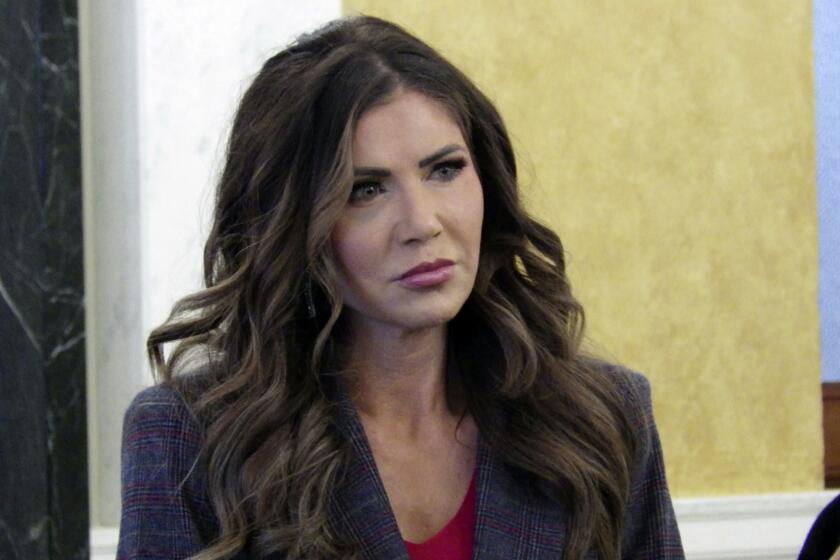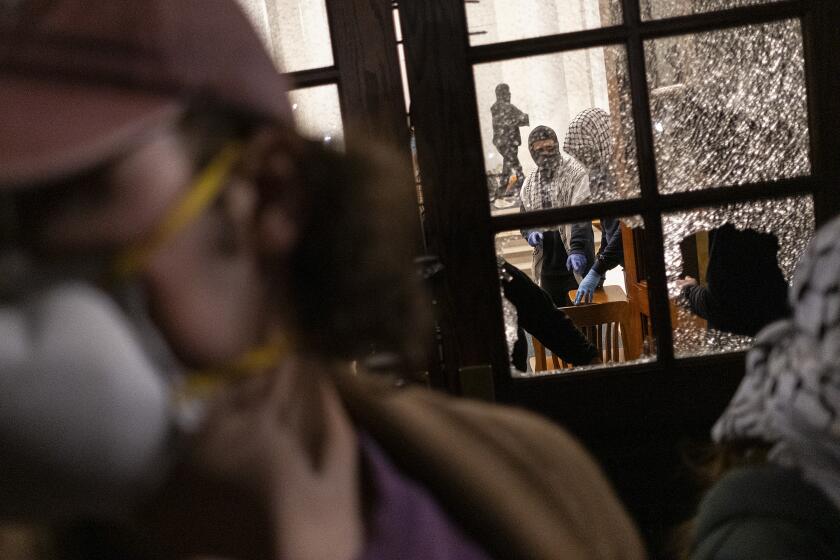Stumbles and falls
It’s not often that you see political power disappear right before your very eyes.
But watching the California Legislature in action last week felt like watching the end of an era -- and bearing witness to the creation of a power vacuum. In a political ballet that played out over several days, the prospects for two seemingly unrelated but intimately connected political issues -- a healthcare reform bill and a change in the state’s term-limits law -- withered simultaneously. And as their fortunes sank, so did the power of the current legislative leadership.
The immediate stage was a state Senate Health Committee hearing on the $14.5-billion healthcare plan that would require nearly all Californians to obtain insurance. The bill had a tough time getting through the Assembly in December despite the fact it was written by Speaker Fabian Nunez (D-Los Angeles). Indeed, without pressure from some of the state’s strongest unions, the measure might not have passed. Now the legislation had to clear a Senate panel whose leader supports a different healthcare plan.
Meanwhile, rumors were swirling around the Capitol that polling numbers showed that Proposition 93 was in big trouble among voters. The initiative on the Feb. 5 ballot would allow legislators to serve 12 years in either the Assembly or the Senate. Currently, lawmakers may serve three two-year terms in the Assembly and two four-year terms in the Senate.
The fate of Proposition 93 is crucial to the legislative careers of Nunez and Senate President Pro Tem Don Perata (D-Oakland). If it passes, Nunez could serve until 2014, and Perata could remain in office until 2012. If the measure is defeated, both leaders would be termed out in November.
The term-limits reform initiative and the healthcare plan cast a shadow over the entire legislative year. Gov. Arnold Schwarzenegger made healthcare reform his top priority, and Nunez was the principal force behind Proposition 93. Their apparent demise made last week feel as if it was the old guard’s last stand.
The committee hearing began Wednesday. The panel has 11 members, five of whom are Republicans and opposed to the healthcare bill. All six Democratic members would have to vote for the bill to send it to the Senate, where approval is almost certain.
As the hearing got underway, it became clear that Perata, a cosponsor of the legislation, would quickly lose control of the bill in his own house. Sheila Kuehl (D-Santa Monica), the committee chair, announced that she would vote against it because the insurance the legislation requires Californians to buy would be too expensive for working- and middle-class families.
Then Leland Yee (D-San Francisco) echoed her vote, objecting to the provision in the bill that would require most Californians to buy health insurance without establishing cost controls on the premiums.
Perata threw in the towel and requested that the committee’s vote be postponed until Monday.
Then more bad news for the healthcare bill. Mid-afternoon Wednesday, Gloria Negrete McLeod (D-Chino) announced that she too was voting against the legislation, citing concerns about the affordability of the mandated insurance. After her vote, a senator who sits on the committee characterized the situation as a “total implosion.” He told me that the rumored poll numbers on Proposition 93 were making it harder to get the healthcare bill out of committee. If the prospects for the initiative’s passage were as bad as the numbers suggested, he said, the stigma of a lame duck, and a corresponding loss of influence, might attach to Perata and Nunez
Barring some legislative magic from Perata, the healthcare bill appears likely to die in committee.
Meanwhile, outside the hearing room, word was beginning to spread that numbers from a Democratic pollster and the Field Poll showed support for Proposition 93 cratering. The Field Poll, due to be published the next day, showed the initiative attracting just 39% support among voters, down from the mid-50s in December’s poll. The most powerful men in the Capitol, Nunez and Perata, could only watch as their political power seemed to be evaporating in real time.
The faltering healthcare bill and bad polling numbers for Proposition 93 were also bad news for Schwarzenegger, who pushed healthcare reform as key to his legacy as governor. And he endorsed Proposition 93, despite the fact that Nunez and Perata did not fulfill their promise to reform the way California draws its congressional and legislative districts. The Republican caucuses in the Assembly and Senate oppose both measures.
Although his approval rating remains around 60%, according to a recent Los Angeles Times Poll, one can’t help but sense that Schwarzenegger’s political luck in surviving legislative setback may be ending.
Still, it’s certainly possible that there will be a healthcare bill for Schwarzenegger to sign and that approval of Proposition 93 will clear 50% once ads supporting it start flooding the media. Their failure, however, would signal the end of an era in Sacramento.
More to Read
Get the L.A. Times Politics newsletter
Deeply reported insights into legislation, politics and policy from Sacramento, Washington and beyond. In your inbox three times per week.
You may occasionally receive promotional content from the Los Angeles Times.






